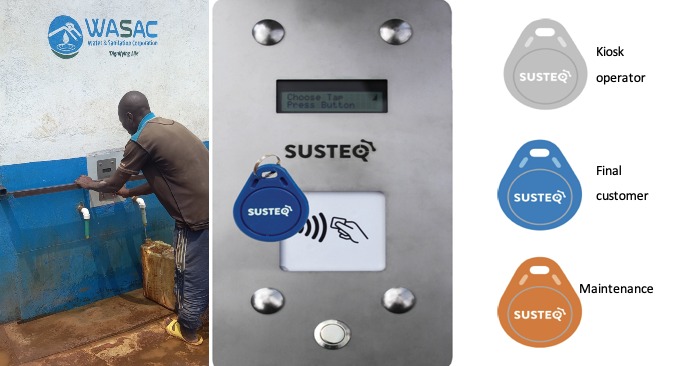Water and Sanitation Corporation (WASAC Ltd) introduced prepaid meters to improve revenue collection and subsequently enhance water service provision to customers. Under the implementation of SCALE project, a Water Operators’ Partnership project with VEI (Dutch Water Operators), 200 prepaid meters are planned to be installed on public taps in the city of Kigali and the Eastern Province in the pilot phase. The project is co-funded through Sustainable Water Fund (FDW), which is managed by Netherlands Enterprises Agency (RVO) on behalf of the Dutch Ministry of Foreign Affairs.
Under SCALE Project, 49 meters are currently being tested at public water stands in the said location. According to Dr Kabasha Asaph, SCALE Project Coordinator the technology is simple and user-friendly for customers and initial reports indicated that WASAC is improving its revenue collection.
How the technology works
A prepaid water meters is a device in form of water hubs/dispensers with a maximum of three taps per hub. They have an electronic flow meter and valve, and a button on each tap to start and end the transaction. They measure the paid upfront amount of water supplied to a consumer. The consumer has a token that communicates to the hub, which he uses to fetch water at the kiosk during any time (day and night), 24/7 without the need for a kiosk or public tap operator. The meters use GSM/GPRS to communicate and incorporate mobile payment channels, like MTN Mobile Money and Airtel Money, to purchase water credits.
Benefits of the technology
This technology has led to a notable increase in revenue from water sales and a reduction in levels of non-revenue water. The consumers are more responsible while fetching water by ensuring that any water that gets out of the tap is captured by their jerricans. Previously, water loss and spillage would be borne by the management of the system.
With the water meters, consumers are able to collect water at a time most convenient to them, reducing long queues of people that were previously lining up to collect water before the kiosks closed. Armed with the tokens, consumers, who are mostly women, are able to invest their saved time engaging in gainful economic activities such as livestock production, small-scale crop farming and improved childcare practices while girls are now able to spend more time in school.


